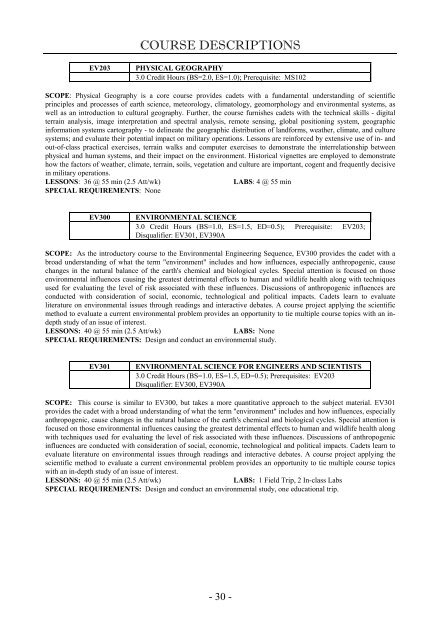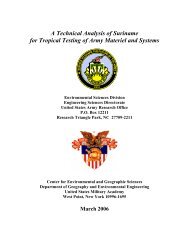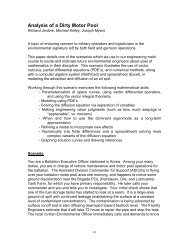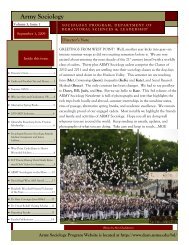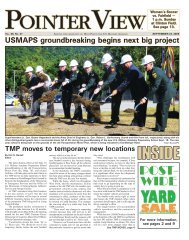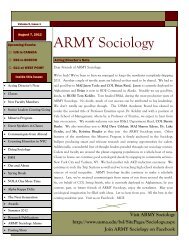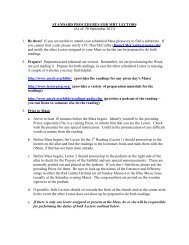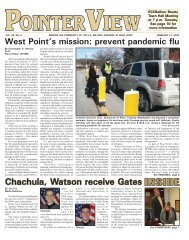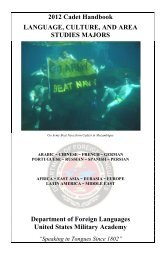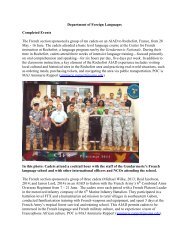GENE Catalog (aka Grey Book): Class of 2010 - West Point
GENE Catalog (aka Grey Book): Class of 2010 - West Point
GENE Catalog (aka Grey Book): Class of 2010 - West Point
- TAGS
- gene
- catalog
- grey
- class
- www.usma.edu
Create successful ePaper yourself
Turn your PDF publications into a flip-book with our unique Google optimized e-Paper software.
COURSE DESCRIPTIONS<br />
EV203 PHYSICAL GEOGRAPHY<br />
3.0 Credit Hours (BS=2.0, ES=1.0); Prerequisite: MS102<br />
SCOPE: Physical Geography is a core course provides cadets with a fundamental understanding <strong>of</strong> scientific<br />
principles and processes <strong>of</strong> earth science, meteorology, climatology, geomorphology and environmental systems, as<br />
well as an introduction to cultural geography. Further, the course furnishes cadets with the technical skills - digital<br />
terrain analysis, image interpretation and spectral analysis, remote sensing, global positioning system, geographic<br />
information systems cartography - to delineate the geographic distribution <strong>of</strong> landforms, weather, climate, and culture<br />
systems; and evaluate their potential impact on military operations. Lessons are reinforced by extensive use <strong>of</strong> in- and<br />
out-<strong>of</strong>-class practical exercises, terrain walks and computer exercises to demonstrate the interrelationship between<br />
physical and human systems, and their impact on the environment. Historical vignettes are employed to demonstrate<br />
how the factors <strong>of</strong> weather, climate, terrain, soils, vegetation and culture are important, cogent and frequently decisive<br />
in military operations.<br />
LESSONS: 36 @ 55 min (2.5 Att/wk) LABS: 4 @ 55 min<br />
SPECIAL REQUIREMENTS: None<br />
EV300 ENVIRONMENTAL SCIENCE<br />
3.0 Credit Hours (BS=1.0, ES=1.5, ED=0.5); Prerequisite: EV203;<br />
Disqualifier: EV301, EV390A<br />
SCOPE: As the introductory course to the Environmental Engineering Sequence, EV300 provides the cadet with a<br />
broad understanding <strong>of</strong> what the term "environment" includes and how influences, especially anthropogenic, cause<br />
changes in the natural balance <strong>of</strong> the earth's chemical and biological cycles. Special attention is focused on those<br />
environmental influences causing the greatest detrimental effects to human and wildlife health along with techniques<br />
used for evaluating the level <strong>of</strong> risk associated with these influences. Discussions <strong>of</strong> anthropogenic influences are<br />
conducted with consideration <strong>of</strong> social, economic, technological and political impacts. Cadets learn to evaluate<br />
literature on environmental issues through readings and interactive debates. A course project applying the scientific<br />
method to evaluate a current environmental problem provides an opportunity to tie multiple course topics with an indepth<br />
study <strong>of</strong> an issue <strong>of</strong> interest.<br />
LESSONS: 40 @ 55 min (2.5 Att/wk) LABS: None<br />
SPECIAL REQUIREMENTS: Design and conduct an environmental study.<br />
EV301 ENVIRONMENTAL SCIENCE FOR ENGINEERS AND SCIENTISTS<br />
3.0 Credit Hours (BS=1.0, ES=1.5, ED=0.5); Prerequisites: EV203<br />
Disqualifier: EV300, EV390A<br />
SCOPE: This course is similar to EV300, but takes a more quantitative approach to the subject material. EV301<br />
provides the cadet with a broad understanding <strong>of</strong> what the term "environment" includes and how influences, especially<br />
anthropogenic, cause changes in the natural balance <strong>of</strong> the earth's chemical and biological cycles. Special attention is<br />
focused on those environmental influences causing the greatest detrimental effects to human and wildlife health along<br />
with techniques used for evaluating the level <strong>of</strong> risk associated with these influences. Discussions <strong>of</strong> anthropogenic<br />
influences are conducted with consideration <strong>of</strong> social, economic, technological and political impacts. Cadets learn to<br />
evaluate literature on environmental issues through readings and interactive debates. A course project applying the<br />
scientific method to evaluate a current environmental problem provides an opportunity to tie multiple course topics<br />
with an in-depth study <strong>of</strong> an issue <strong>of</strong> interest.<br />
LESSONS: 40 @ 55 min (2.5 Att/wk) LABS: 1 Field Trip, 2 In-class Labs<br />
SPECIAL REQUIREMENTS: Design and conduct an environmental study, one educational trip.<br />
- 30 -


